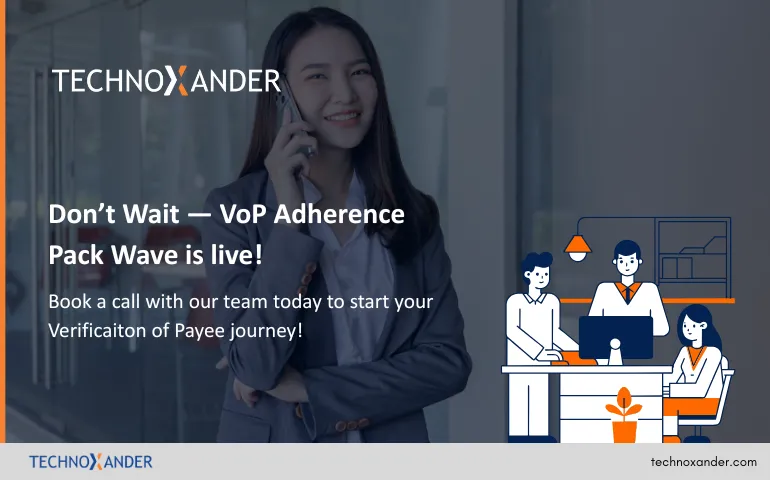The European Payments Council (EPC) plays a central role in the European payments ecosystem bringing harmony to payment processing across the SEPA zone. EPC has published the rulebook for Verification of Payee (VoP) which aims to bring uniformity and alignment to Eurozone payments. This rulebook is important for ensuring error-free payments and fraud prevention in the Single Euro Payments Area (SEPA). It is also key to achieving compliance with the Instant Payment Regulation.
Check out some key points that you can consider following while achieving compliance with Instant Payment Regulation:
- EPC VoP Rulebook sets the standard for verifying payee details across SEPA to reduce fraud and errors.
- It aligns closely with Instant Payment Regulation (IPR) for real-time, secure credit transfers.
- VoP checks must be executed in under 5 seconds, ensuring near-instant verification.
- Services must be available 24/7/365 to comply with IPR and EPC scheme requirements.
- EPC VoP allows name or identifier-based checks, enhancing flexibility and accuracy.
- Responding PSPs must return match, no-match, or close-match results with transparency.
- EPC VoP ensures interoperability across all SEPA participants for seamless implementation.
- TechnoXander’s VoP solution is fully EPC-compliant and exceeds IPR performance standards.
- Banks should evaluate VoP providers on EPC and IPR compliance readiness.
- TechnoXander enables FIs to meet these standards confidently through its RVM platform.
This blog covers the key aspects of EPC VoP Rulebook, its scope and the actors involved. It also addresses questions on how EPC rulebook aligns with the Instant Payment Regulation (IPR) VoP requirements, offering insights for decision-makers in banks and financial institutions evaluating VoP product providers.
What is the European Payments Council (EPC)?
The European Payments Council (EPC) comprising PSPs and Payment Associations is one voice on all European payment issues. EPC is also the scheme manager for 5 European Payments scheme which facilitates payments in 38 countries.
Responsible for developing and managing payment schemes across the SEPA area, EPC is tasked with defining and implementing payment standards to promote secure, efficient, and integrated payments. With a view of aligning schemes with regulatory requirements, EPC has set out the VoP guidelines which should become a standard implementation of VoP across all SEPA countries.
What is the EPC Verification of Payee (VoP) Rulebook?
The EPC Verification of Payee (VoP) scheme is a set of rules, practices and standards for verifying Payment Account Numbers (IBAN) and Names of the Payment Counterparties, between Participants of the Scheme prior to initiating a SEPA Credit Transfer. The aim is to achieve interoperability for the provision and operation of VoP scheme across all participants processing SEPA payments.
The EPC Verification of Payee (VoP) Rulebook aims to become an authoritative source of information for PSPs, EMIs and PIs for the functioning of VoP scheme. It also provides details on development and operational activities for VoP which TechnoXander as Routing and Verification Mechanism (RVM) and technology supplier has leveraged to build its EPC compliant VoP product.
How EPC aligns with the IPR Requirements?
The IPR has set out clear compliance requirements when performing VoP checks. The regulation sets out rules on when to execute the VoP checks and what responses can be sent. IPR also has specific requirements for availability and performance.
EPC Rulebook has now set prescriptive set out rules and guidelines which aim to achieve compliance with IPR requirements.
Real time Results: IPR expects the payer’s PSP to perform the Verification of Payee checks immediately after the payer provides relevant information about the payee and before the payer is offered the possibility of authorising that credit transfer.
VoP Scheme sets a maximum execution time of five seconds (preferably 1 second or less) to execute the VOP Request from the moment the Requesting PSP
addresses its VOP Request to the Responding PSP, to the moment the Requesting PSP receives the VOP Response from the Responding PSP to its initial VOP Request.
This is as real time as it gets.
Availability: IPR expects the Verification of Payee service to be provided with Instant Payments all day, throughout the day for 365 days.
The Participants’ services based on the Scheme must be available 24 hours a day and on all Calendar Days of the year.
Name or Identifier-Based Checks: IPR expects the possibility of conducting checks based on name or an identifier which uniquely identifies the payment account.
The VoP scheme has API guidelines which support sending name or identifier for checks to Responding PSP.
Matching: IPR expects the Responding PSP to provide a match, no match and close match response IPR also expects the payer’s PSP to indicate to the payer the name of the payee associated with the payment account identifier provided by the payer where the results of matching is a close match.
The scheme supports the match, close match and no match requirements. The scheme rules state that in case of a ‘Close Match’ the Responding PSP shall provide the Requesting PSP with the name of the Payment Counterparty associated with the payee account.
Why Bank Staff Should Consider EPC VoP Guidelines for Product Selection?
As decision-makers within banks assessing potential VoP product providers, ensuring that RVM or technology provider has a very good understanding the requirements under Instant Payment Regulation and EPC VoP Rulebook is essential. It provides a certainty that the selected solution ensures compliance with both the EPC guidelines and the Instant Payment Regulation.
By adopting an EPC-compliant VoP RVM or technology service provider, PSPs can confidently achieve compliance, improve transaction security, reduce fraud risks, and enhance customer confidence.
Write to us at vop@technoxander.com to learn how our EPC-compliant VoP solution complies with Instant Payment Regulation and goes a step further. Being the compliance journey with right partners!










